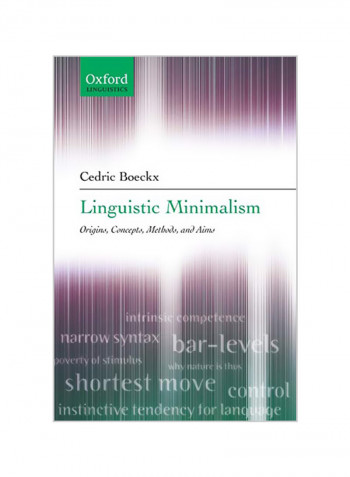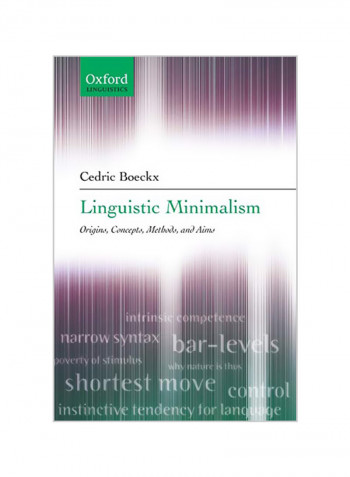Linguistic Minimalism: Origins, Concepts, Methods, And Aims Paperback
Recommend
Sort by
Rating
Date
Specifications
Author 1
Cedric Boeckx
Book Description
The Minimalist Program for linguistic theory is Noam Chomsky's boldest and most radical version of his naturalistic approach to language. Cedric Boeckz examines its foundations, explains its underlying philosophy, exemplifies its methods, and considers the significance of its empirical results. He explores the roots and antecedents of the Program and shows how its methodologies parallel those of sciences such as physics and biology. He disentangles and clarifies current debates and issues around the nature of minimalist research in linguistics and shows how the aims and ambitions of the Minimalist Program lie at the centre of the enterprise to understand how the human language faculty operates in the mind and is manifested in the world's languages. Professor Boeckx writes for advanced and graduate students of linguistics and for all those, in fields such as cognitive science and evolutionary biology, who want to know more about current developments in theoretical linguistics.
ISBN-13
9780199297580
Language
English
Publisher
Oxford University Press
Publication Date
09-11-2006
Number of Pages
258
About the Author
Cedric Boeckx is Assistant Professor of Linguistics at Harvard University, and a member of the Mind-Brain-Behavior Initiative. He received his PhD from the University of Connecticut in 2001. He has held visiting positions at the Universities of Illinois and Maryland. His main research interests are in theoretical syntax, comparative grammar, and architectural questions of language, including its origins and its development in children, as well as its neurobiological basis. He is the author of Islands and Chains (2003) and, with Howard Lasnik and Juan Uriagereka, A Course in Minimalist Syntax (2005). He is co-editor with Kleanthes K. Grohmann of Multiple Wh-fronting (2003) and has published mumerous articles in journals such as Linguistic Inquiry and Natural Language and Linguistic Theory.
Editorial Review
An engaging, accessible, important exposition of Chomsky's pioneering Program, including its normal scientific evolution, the higher standards of explanation it imposes and the exciting new interdisciplinary linkages it has established. * Samuel David Epstein, University of Michigan * Linguistic Minimalism, Origins, Methods, and Aims is an insightful presentation of the conceptual underpinnings and internal logic of the Minimalist Program. It will show the curious why those of us pursuing this program are so excited by its prospects. * Howard Lasnik, University of Maryland * This deeply-informed study, drawing from a wide diversity of domains, provides a thoughtful perspective on how a minimalist program in linguistics emerges as a natural outcome of advances in understanding of the nature of language and its acquisition. It also outlines a course the program might take in seeking to identify the distinctive properties of human language, seperating them from the effects of more general principles, which may reduce to laws of nature. To determine its special properties has been the goal of serious enquiry into language from its ancient origins. Such inquiry is now taking quite new forms, and, as Boeckx shows, is productively investigating questions that could scarcely have been formulated not long ago. * Noam Chomsky * Cedric Boeckx has constructed an illuminating nontechnical exposition of the character, historical roots, new insights, and profound interdisciplinary reach of the Minimalist Program, which has for over a decade been moving the biolinguistic approach to the study of language and mind forward. For anyone who wants to learn (more) about the MP, this valuable overview is an excellent starting point. * Robert Freidin, Princeton University * I recommend Linguistic minimalism to anyone with a good background in syntactic theory who wants to know what the minimalist program is all about. * Frederick J. Newmeyer, Language, vol. 84, no.2, 2008



